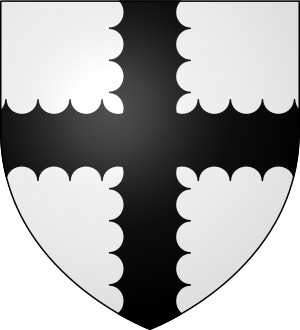William St Clair, 13th Baron of Roslin facts for kids
Quick facts for kids
William St Clair
|
|
|---|---|
| Baron of Roslin | |

Baron of Roslin coat of arms
|
|
| Predecessor | Oliver St Clair, 12th Baron of Roslin |
| Successor | William St Clair, 14th Baron of Roslin |
| Died | 1554 |
| Noble family | Clan Sinclair |
| Father | Oliver St Clair |
William St Clair (died around 1554) was an important Scottish nobleman. He held the title of the 13th Baron of Roslin. This meant he was a powerful lord who owned the lands and castle of Roslin in Scotland.
Contents
Who Was William St Clair?
William St Clair was a significant figure in Scottish history during the 1500s. He inherited his family's lands and titles, becoming a key supporter of the Scottish Crown. His life shows how important noble families were in shaping the country.
Early Life and Family Lands
William was the oldest son of Oliver St Clair, 12th Baron of Roslin. His father passed away before 1523. After his father's death, William took over the Roslin lands and title. This made him the new Baron of Roslin.
Around 1523, William showed his support for the church. He gave some land to the Prebendars of the College of Roslin. Prebendars were church officials who received income from specific lands to support their work.
A Powerful Baron
As the Baron of Roslin, William St Clair had many important duties and rights. He was given the right to patronage the Collegiate Chapel of Roslin and Chapel of St. Mathew. Patronage meant he had the power to appoint priests and manage some of the chapel's affairs.
Royal Connections
William was well-liked by the king, James V of Scotland. In 1533, King James V gave William a special document called a charter. This charter confirmed and renewed older rights and lands that had been given to William's ancestor, Henry I Sinclair, Earl of Orkney. This showed the king's trust in William.
William also made sure his family's lands would stay in their hands. He set up a plan for Roslin and Herbertshire to pass down to his sons in a specific order. If his sons couldn't inherit, the lands would go to his brothers.
William St Clair also received money from the queen, Mary of Guise. She gave him an annual payment of 300 merks (an old Scottish coin) because he was loyal to the Crown. His loyalty meant he supported the king and queen. King James V often asked William to attend Parliament, which was a meeting of important people who helped make laws for the country.
William St Clair passed away sometime before 1554.
His Family
William Sinclair, Baron of Roslin, married a woman named Alison. She was the daughter of George Home, 4th Lord Home. Together, William and Alison had eight sons:
- William St Clair, 14th Baron of Roslin: He was the oldest son and inherited his father's title and lands.
- Gilbert St Clair
- Patrick St Clair
- Alexander St Clair: He owned lands in Cuthilton and Little Denny. His son, Hercules, might have been a reverend who broke religious images in Shetland.
- John St Clair
- Oliver St Clair: He lived in Westravensneuk.
- Mathew St Clair
- Edward St Clair: He owned lands in Dryden and Ethay in Orkney.
See also
 | Dorothy Vaughan |
 | Charles Henry Turner |
 | Hildrus Poindexter |
 | Henry Cecil McBay |

